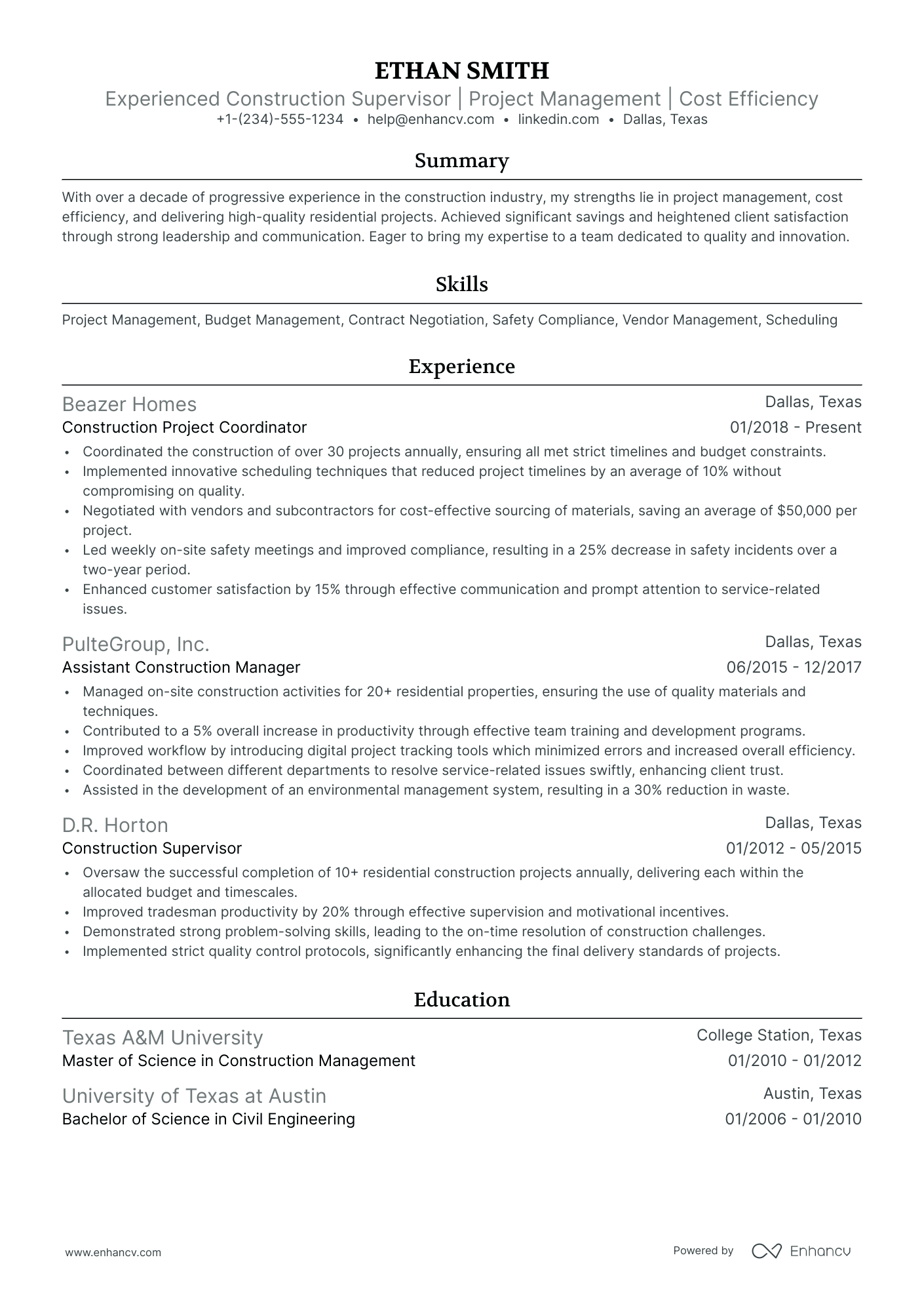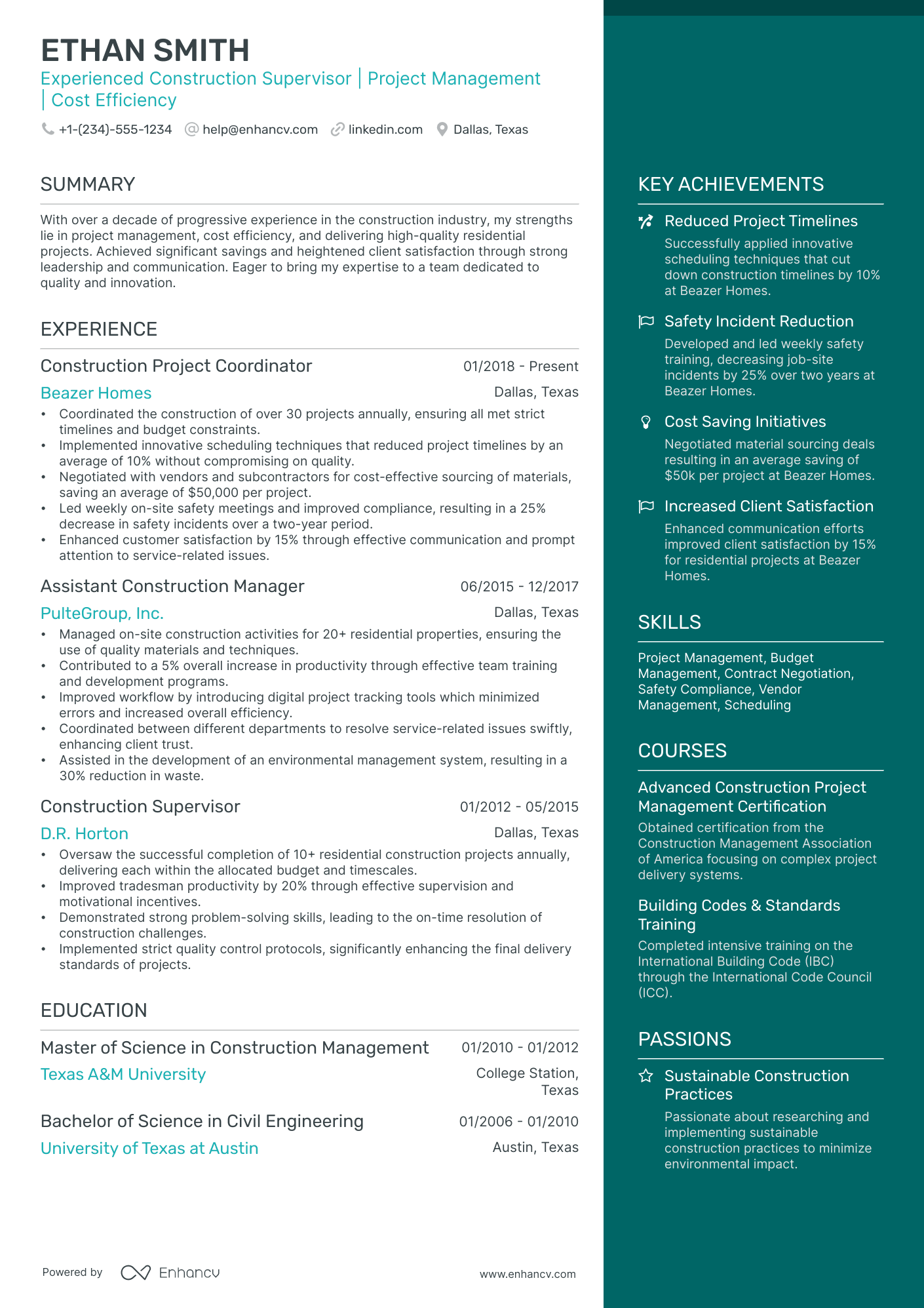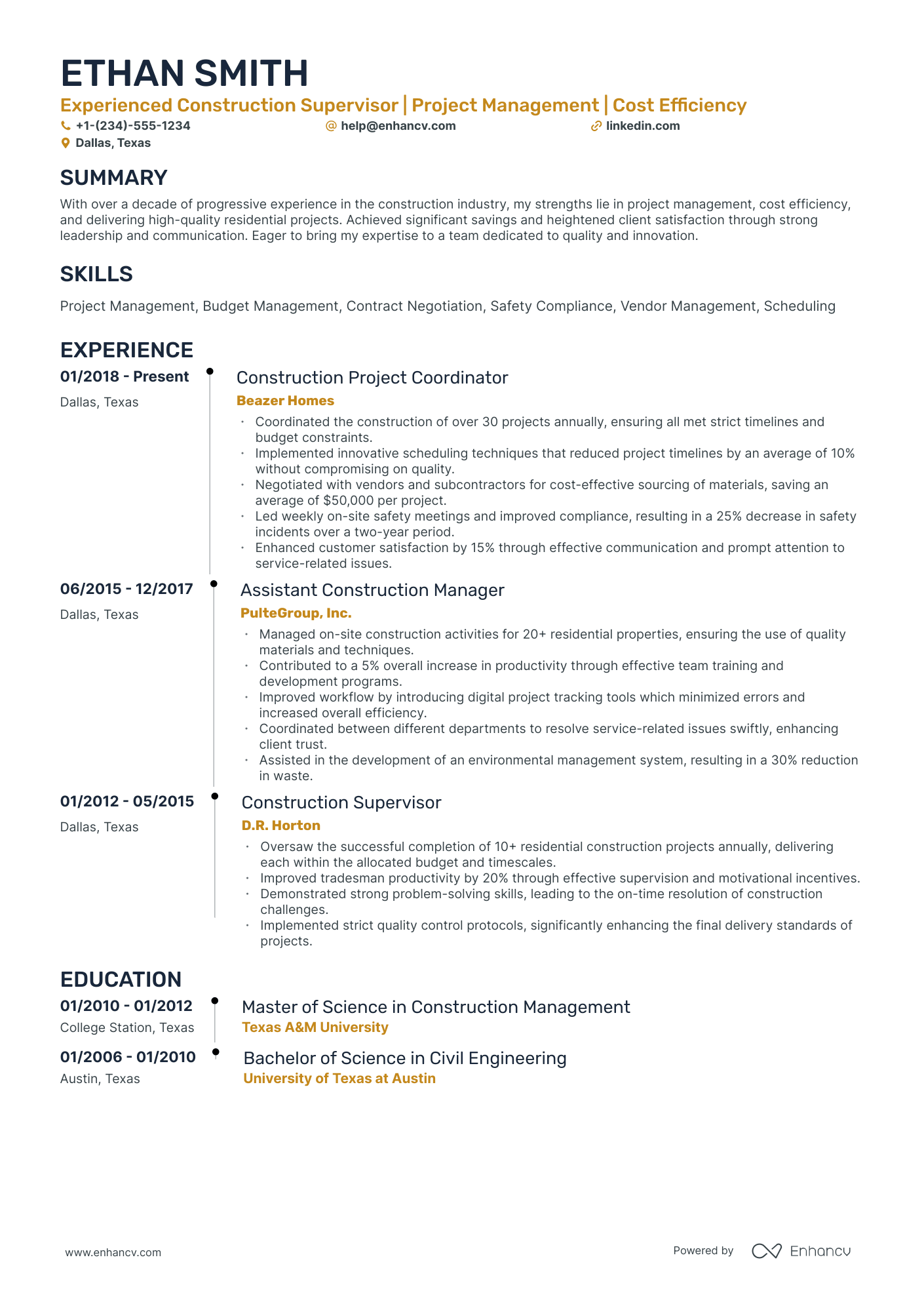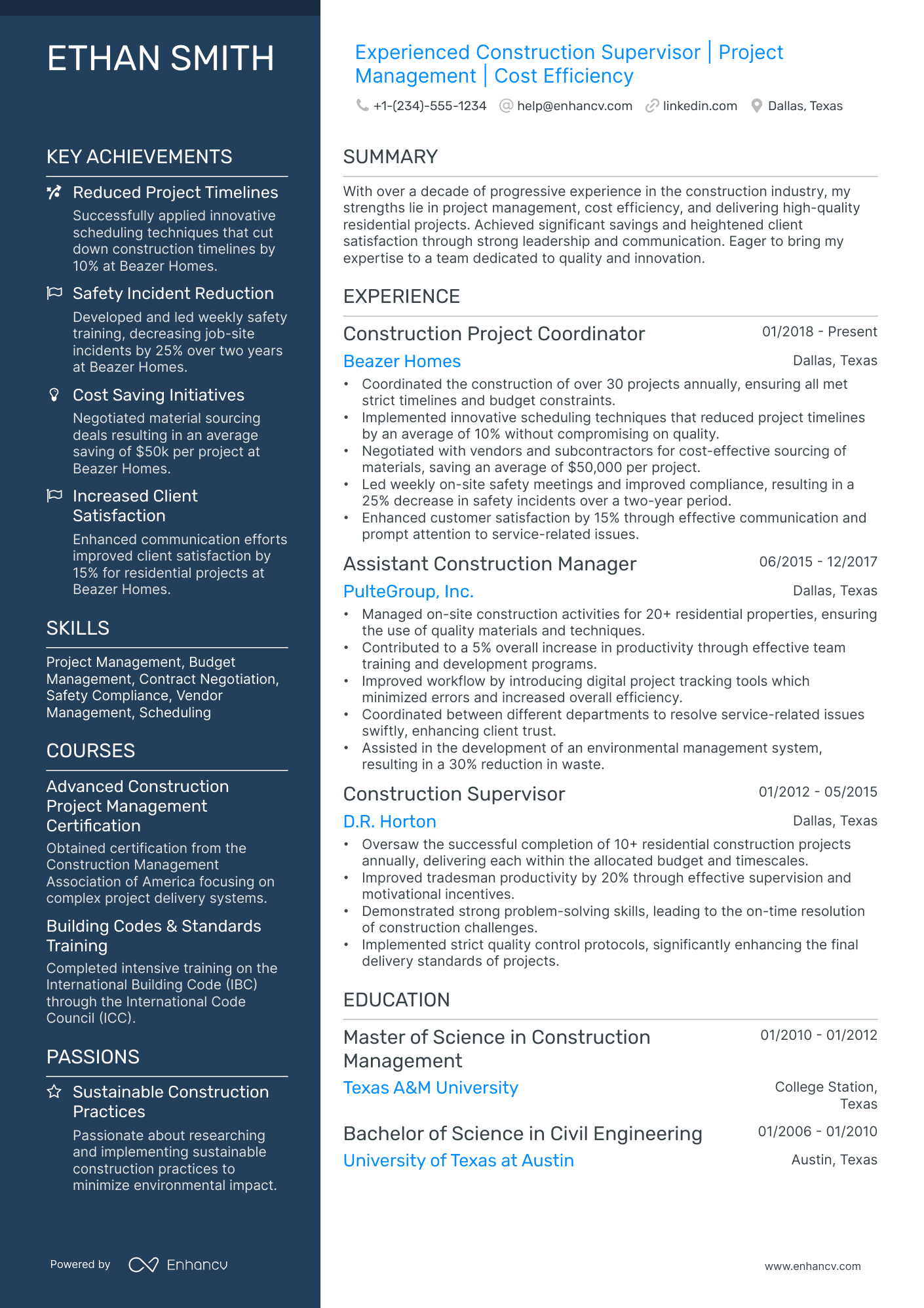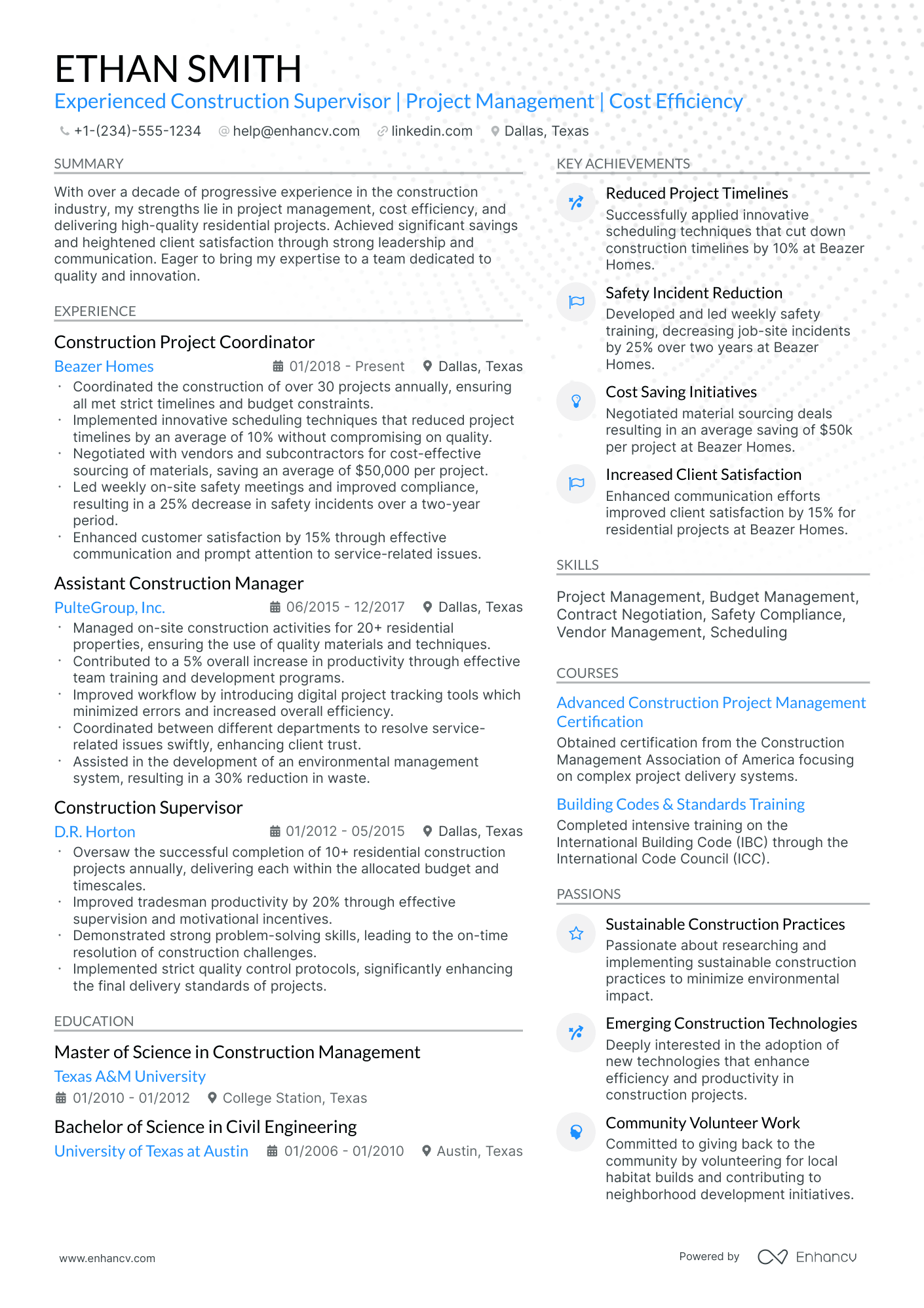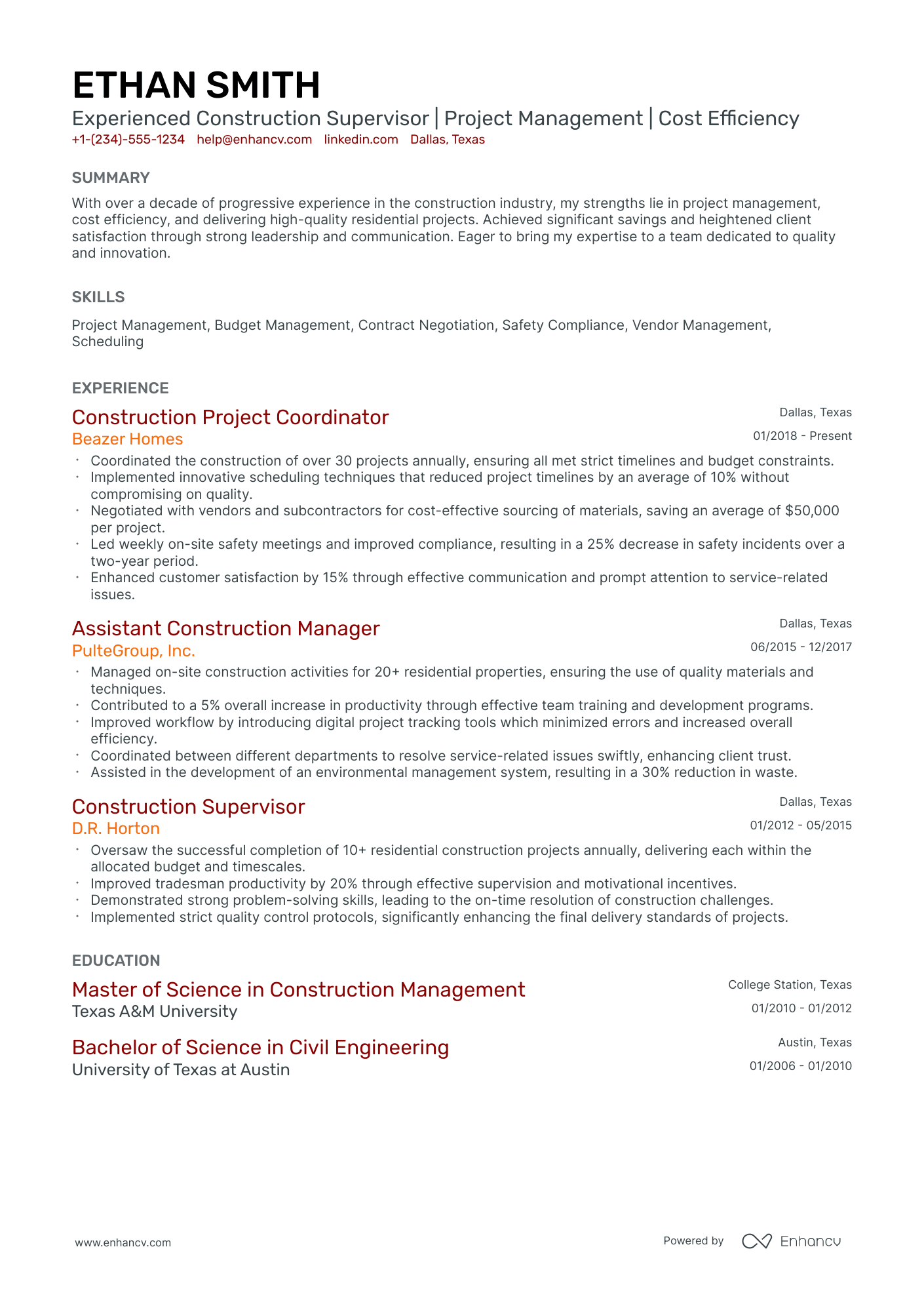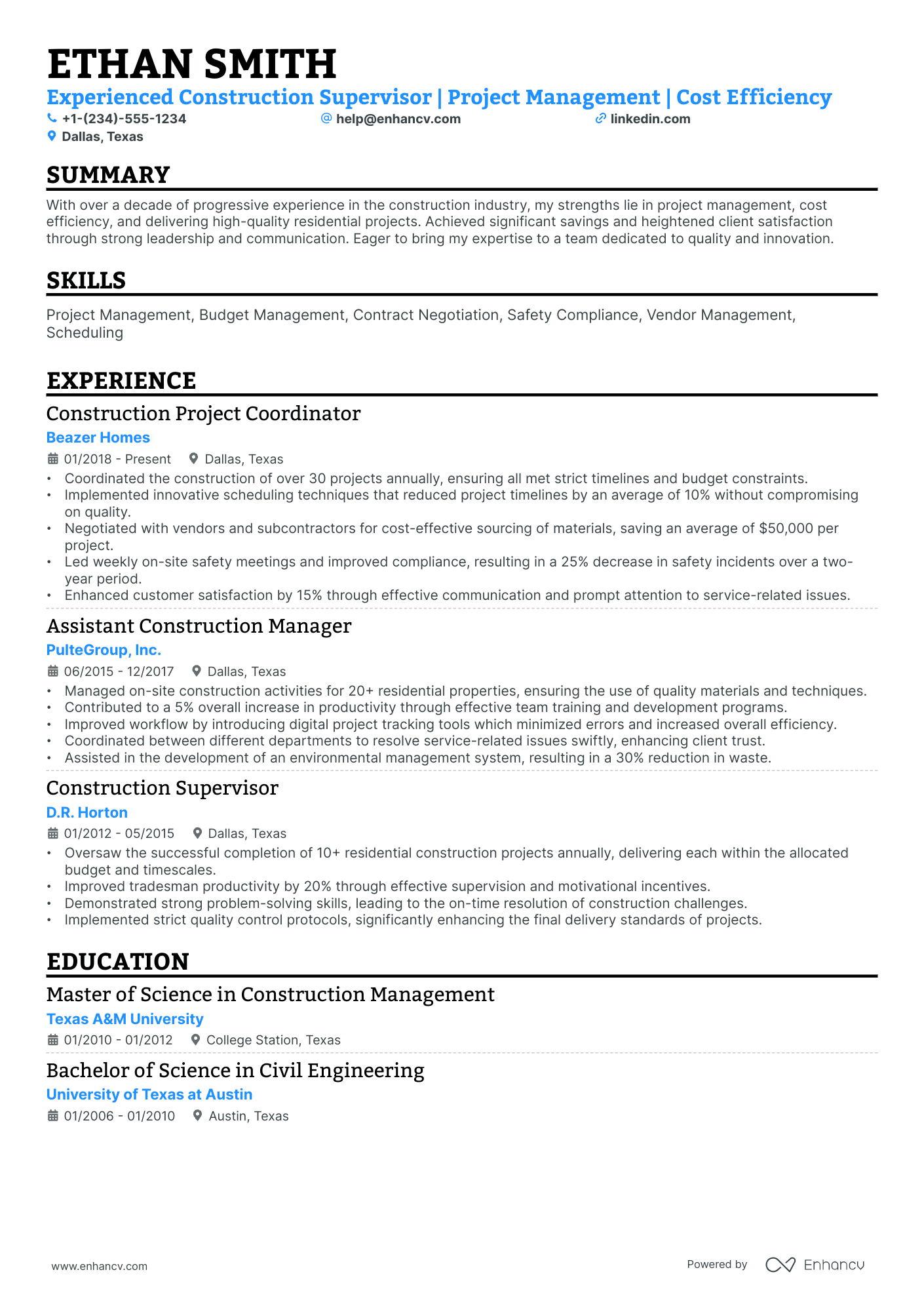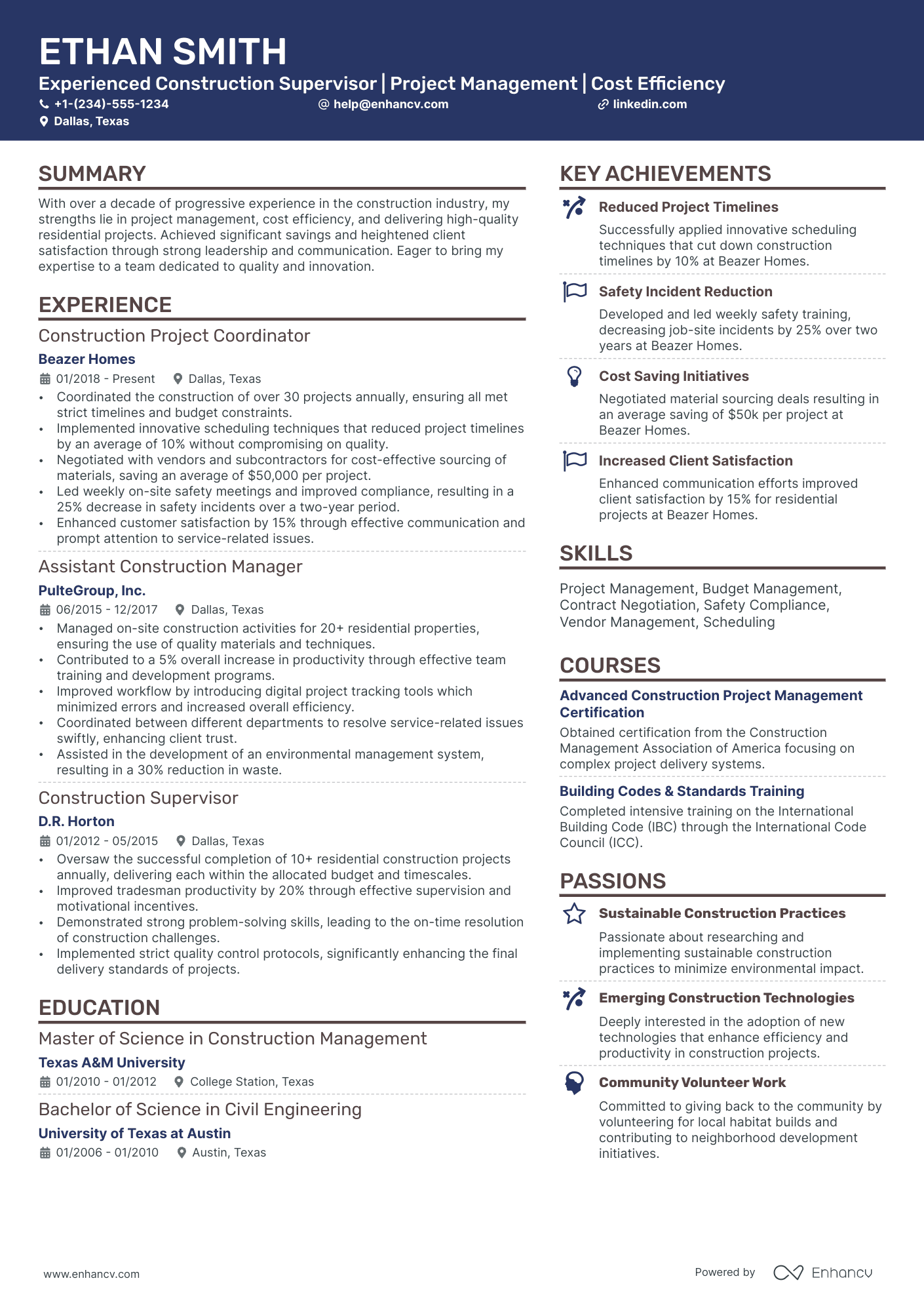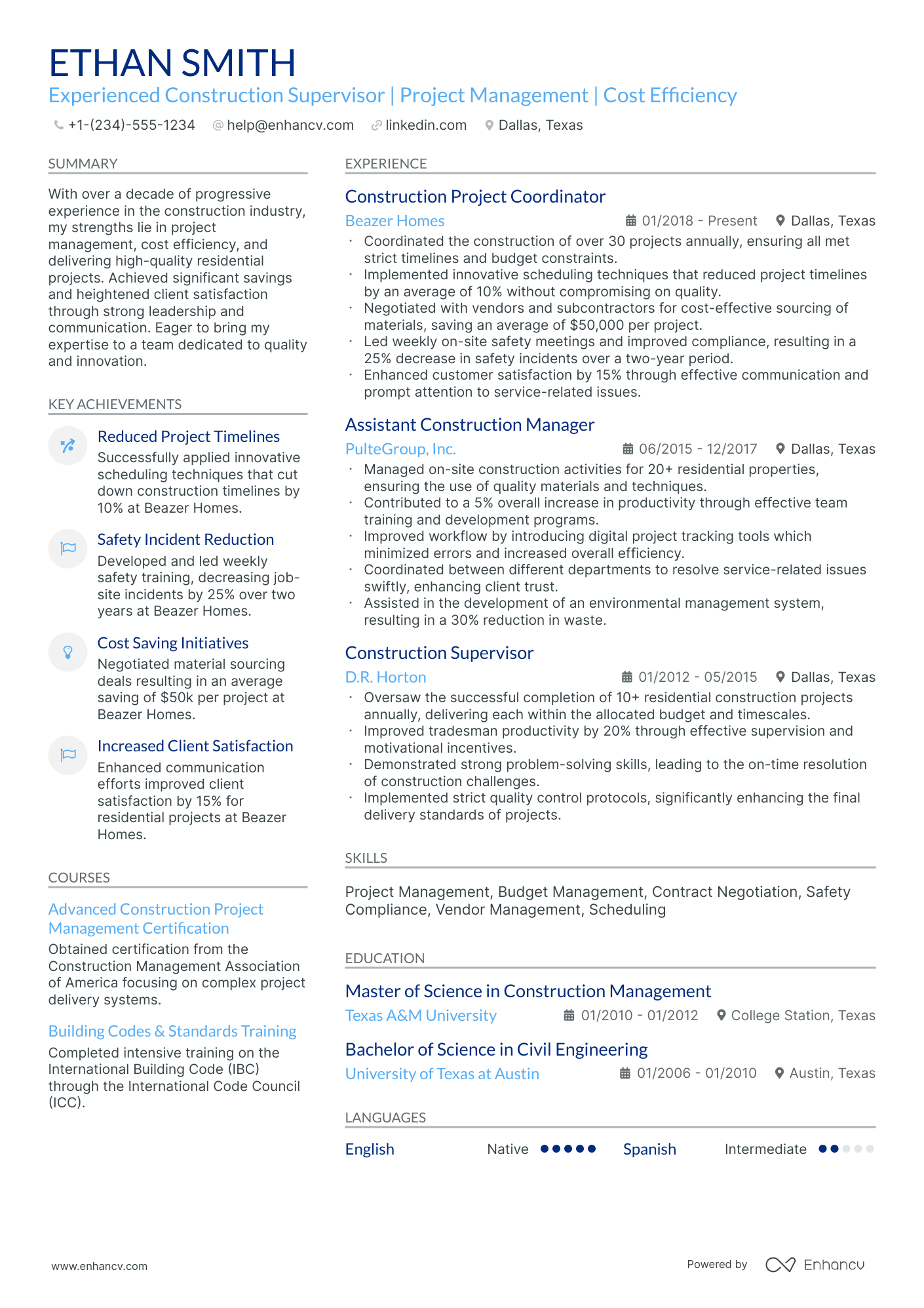As a construction manager, one resume challenge you may face is effectively showcasing your project management skills to stand out in a competitive job market. Our comprehensive guide provides targeted tips and examples to help you highlight your accomplishments and convey your expertise in managing complex construction projects with precision.
- Incorporate construction manager job advert keywords into key sections of your resume, such as the summary, header, and experience sections;
- Quantify your experience using achievements, certificates, and more in various construction manager resume sections;
- Apply practical insights from real-life construction manager resume examples to enhance your own profile;
- Choose the most effective construction manager resume format to succeed in any evaluation process.
- Engineering Program Manager Resume Example
- Aerospace Engineering Resume Example
- Electrical Manager Resume Example
- Construction Superintendent Resume Example
- Petroleum Engineer Resume Example
- Construction Worker Resume Example
- Energy Manager Resume Example
- Engineering Project Manager Resume Example
- Landscape Architect Resume Example
- Architectural Project Manager Resume Example
Best practices for the look and feel of your construction manager resume
Before you even start writing your construction manager resume, first you need to consider its layout and format.
What's important to keep in mind is:
- The reverse-chronological resume is the most widely used format to present your experience, starting with your latest job.
- Your construction manager resume header needs to include your correct, professional contact details. If you happen to have a professional portfolio or an updated LinkedIn profile, include a link to it.
- Ensure your resume is no longer than two pages - you don't have to include irelevant experience on your resume just to make it look longer.
- Unless specified otherwise, submit your resume in the most popular format, the PDF one, as this will ensure your construction manager resume isn't altered.
Different markets have specific resume formats – a Canadian resume could vary in layout.
Upload & Check Your Resume
Drop your resume here or choose a file. PDF & DOCX only. Max 2MB file size.
PRO TIP
Listing your relevant degrees or certificates on your construction manager resume is a win-win situation. Not only does it hint at your technical capabilities in the industry, but an array of soft skills, like perseverance, adaptability, and motivation.
The five (plus) definite sections your resume for a construction manager job should include are:
- Header with your headline, contact details, and/or a preview of your work
- Summary (or objective) to pinpoint how your success aligns with the role
- Experience with bullets of your most relevant achievements in the field
- Skills to integrate vital job requirements (both technical and personal)
- Your further dedication to the field, showcased via relevant higher education and/or certifications
What recruiters want to see on your resume:
- Proven experience in managing large-scale construction projects from start to finish, including project planning, budgeting, and execution.
- Demonstrated ability to effectively lead and coordinate cross-functional teams, including architects, contractors, engineers, and sub-contractors.
- Strong understanding of building codes, safety regulations, and quality standards, along with a track record of ensuring compliance on all projects.
- Expertise in construction methodologies, project management software (e.g., Procore, AutoCAD), and proficiency in schedule and budget management.
- Excellent problem-solving skills with the ability to handle conflicts, delays, and unexpected challenges swiftly and efficiently.
The construction manager resume experience section: a roadmap to your expertise
The resume experience section provides you with an opportunity to tell your professional narrative.
Recruiters, reading between the lines of your resume, use the experience section to better understand your unique skill set, accomplishments, and what unique value you bring about.
Discover five quick steps on how to write your experience section:
- Curate only relevant experience items to the role and include the company, description, and dates; all followed by up to six bullets per experience item;
- Each experience item should feature tangible results of your actions - if you can include a number or percent, this will further highlight your aptitude;
- If you've received any managerial or customer feedback, use short excerpts of it as further social proof of your technical or people skills;
- Make sure you're using the appropriate verb tense when listing your responsibilities;
- Within the description for each role, you could summarize your most noteworthy and relevant achievements.
Now, take note of how a real-world construction manager professional received opportunities at industry leaders with these resume experience sections:
- Directed a team of 30+ on the $50 million Lakeside Plaza project, maintaining strict adherence to safety protocols and building codes.
- Implemented cost-saving strategies that reduced project expenses by 15%, enabling reallocation of funds to additional architectural enhancements.
- Established a robust subcontractor vetting process that improved project efficiency and turnaround times by approximately 20%
- Spearheaded the Harborview Office Park development, managing timelines and coordinating between diverse engineering teams and stakeholders.
- Negotiated contracts and materials procurement saving the firm an average of 10% on purchasing costs across all projects.
- Pioneered the use of green building practices that led to a 30% improvement in energy efficiency for completed projects.
- Oversaw the successful completion of the Rivertown Mixed-Use Development, ensuring on-time delivery despite a condensed 18-month timeline.
- Deployed innovative construction management software that increased reporting accuracy and improved communication across project teams.
- Fostered a culture of continuous improvement which resulted in a 25% decrease in reported incidents and increased team morale.
- Managed operational aspects of commercial construction projects valued over $40 million while maintaining stringent quality control measures.
- Cultivated partnerships with local suppliers to streamline supply chains, resulting in reduced wait times for materials by 15%.
- Enhanced cross-functional team productivity through targeted training programs, boosting project completion efficiency by over 20%.
- Headed the redevelopment of historic downtown areas, integrating modern construction while preserving the community's traditional aesthetic.
- Engaged with city planners and regulatory officials to ensure compliance, facilitating smooth project progression without legal obstacles.
- Collaborated with architects and engineers to incorporate sustainable design features that contributed to LEED certification for new structures.
- Administered the construction of high-end residential complexes with budgets in excess of $30 million, achieving top-notch resident satisfaction post occupancy.
- Instituted a comprehensive quality management system that reduced rework by 22% and expedited project completion rates.
- Championed the integration of advanced BIM technologies, enhancing the precision of construction documentation and project visualization.
- Orchestrated the site development for industrial complexes, optimizing logistical workflows and decreasing downtime by 18%.
- Led the charge in adopting drone technology for site surveys, which increased the accuracy of land assessments and cut survey costs by 25%.
- Succeeded in bid proposals leading to a 50% growth in the company's construction project portfolio within a 3-year period.
- Coordinated the tech-forward 'Smart Building' initiative, aligning IT infrastructure with construction design to elevate building intelligence capabilities.
- Effectively balanced multiple projects valued up to $60 million, with a focus on stringent cost control, tracking, and reporting methods.
- Enhanced subcontractor performance through the development of a metric-driven evaluation system that fostered accountability and quality workmanship.
The following content includes information from "O*NET OnLine" by the U.S. Department of Labor, Employment and Training Administration (USDOL/ETA). Used under the CC BY 4.0 license. The data represents the top responsibilities present on the task lists for construction manager professionals.
Top Responsibilities for Construction Manager:
- Plan, schedule, or coordinate construction project activities to meet deadlines.
- Prepare and submit budget estimates, progress reports, or cost tracking reports.
- Interpret and explain plans and contract terms to representatives of the owner or developer, including administrative staff, workers, or clients.
- Direct and supervise construction or related workers.
- Prepare contracts or negotiate revisions to contractual agreements with architects, consultants, clients, suppliers, or subcontractors.
- Confer with supervisory personnel, owners, contractors, or design professionals to discuss and resolve matters, such as work procedures, complaints, or construction problems.
- Plan, organize, or direct activities concerned with the construction or maintenance of structures, facilities, or systems.
- Study job specifications to determine appropriate construction methods.
- Inspect or review projects to monitor compliance with building and safety codes or other regulations.
- Investigate damage, accidents, or delays at construction sites to ensure that proper construction procedures are being followed.
Quantifying impact on your resume
- Include the total value of construction projects you’ve successfully managed, demonstrating your experience with large-scale investments.
- Mention the percentage by which you’ve reduced project costs through efficient management to highlight your cost-saving skills.
- Specify the number of subcontractors you’ve coordinated with to showcase your ability to manage complex teams.
- Quantify the reduction in construction time achieved on projects to underline your productivity and time management.
- List safety incident rates under your management to show your commitment to creating a safe work environment.
- Record the number of projects completed before the deadline to demonstrate your effectiveness in meeting targets.
- Provide figures for the amount of materials sourced sustainably to reflect your dedication to environmentally responsible construction practices.
- State the number of different construction software tools you are proficient in to emphasize your technical competencies.
Action verbs for your construction manager resume
Experience section for candidates with zero-to-none experience
While you may have less professional experience in the field, that doesn't mean you should leave this section of your resume empty or blank.
Consider these four strategies on how to substitute the lack of experience with:
- Volunteer roles - as part of the community, you've probably gained valuable people (and sometimes even technological capabilities) that could answer the job requirements
- Research projects - while in your university days, you may have been part of some cutting-edge project to benefit the field. Curate this within your experience section as a substitute for real-world experience
- Internships - while you may consider that that summer internship in New York was solely mandatory to your degree, make sure to include it as part of your experience, if it's relevant to the role
- Irrelevant previous jobs - instead of detailing the technologies you've learned, think about the transferable skills you've gained.
Recommended reads:
PRO TIP
Bold the names of educational institutions and certifying bodies for emphasis.
How to showcase hard skills and soft skills on your resume
Reading between the lines of your dream job, you find recruiters are looking for candidates who have specific software or hardware knowledge, and personal skills.
Any technology you're adept at shows your hard skills. This particular skill set answers initial job requirements, hinting at how much time your potential employers would have to invest in training you. Showcase you have the relevant technical background in your communicate, solve problems, and adapt to new environments. Basically, your interpersonal communication skills that show recruiters if you'd fit into the team and company culture. You could use the achievements section to tie in your greatest wins with relevant soft skills.
It's also a good idea to add some of your hard and soft skills across different resume sections (e.g. summary/objective, experience, etc.) to match the job requirements and pass the initial screening process. Remember to always check your skill spelling and ensure that you've copy-pasted the name of the desired skills from the job advert as is.
Top skills for your construction manager resume:
Project Management Software
Building Information Modeling (BIM)
AutoCAD
Scheduling Software (e.g., Primavera, Microsoft Project)
Cost Estimation Tools
Construction Management Software (e.g., Procore, PlanGrid)
Contract Management Tools
Quality Control Software
Safety Management Systems
Blueprint Reading
Leadership
Communication
Problem-Solving
Negotiation
Time Management
Team Collaboration
Adaptability
Decision-Making
Conflict Resolution
Critical Thinking
Next, you will find information on the top technologies for construction manager professonals from "O*NET OnLine" by the U.S. Department of Labor, Employment and Training Administration (USDOL/ETA). Used under the CC BY 4.0 license.
Top technologies for Construction Manager’s resume:
- Database software
- Yardi software
- Dropbox
- Microsoft SharePoint
- HCSS HeavyJob
- Oracle Primavera Enterprise Project Portfolio Management
PRO TIP
The more trusted the organization you've attained your certificate (or degree) from, the more credible your skill set would be.
Discover the perfect certification and education to list on your construction manager resume
Value the insights your resume education section offers. It can shed light on various proficiencies and experiences tailored for the job.
- Add only college or university degrees, stating the institution and duration.
- If you're nearing the end of your degree, note your graduation date.
- Weigh the pros and cons of including unrelated degrees - it might not be your best choice with so little space on your resume.
- Talk about your educational achievements if they amplify your relevant experience.
There are so many certificates you can list on your resume.
Just which ones should make the cut?
- List your prominent higher education degree in a separate box, alongside the name of the institute you've obtained it from and your graduation dates
- Curate only relevant certificates that support your expertise, hard skills, and soft skills
- Certificates that are more niche (and rare) within the industry could be listed closer to the top. Also, this space could be dedicated to more recent certifications you've attained
- Add a description to your certificates or education, only if you deem this could further enhance your chances of showcasing your unique skill set
When listing your certificates, remember that it isn't a case of "the more, the merrier", but rather "the more applicable they are to the industry, the better".
Recruiters have hinted that these are some of the most in-demand certificates for construction manager roles across the industry:
The top 5 certifications for your construction manager resume:
- Certified construction manager (CCM) - Construction Management Association of America (CMAA)
- Associate Constructor (AC) - American Institute of Constructors (AIC)
- Project Management Professional (PMP) - Project Management Institute (PMI)
- Construction Documents Technologist (CDT) - Construction Specifications Institute (CSI)
- LEED Accredited Professional (LEED AP) - U.S. Green Building Council (USGBC)
The content below includes information from "O*NET OnLine" by the U.S. Department of Labor, Employment and Training Administration (USDOL/ETA). Used under the CC BY 4.0 license. The data represents the top associations for construction manager professionals.
Top US associations for a Construction Manager professional
- Construction Management Association of America
- AACE International
- Accreditation Board for Engineering and Technology
- American Council for Construction Education
- American Institute of Architects
PRO TIP
The more time and effort you've put into obtaining the relevant certificate, the closer to the top it should be listed. This is especially important for more senior roles and if the company you're applying for is more forward-facing.
Recommended reads:
The construction manager resume summary or objective: integrating keywords, achievements, and more
Deciding whether to include a resume summary or an objective in your construction manager resume is crucial. Both serve as key introductory elements at the top of your resume, encapsulating your profile in up to five sentences and incorporating relevant keywords from the job advert.
Here are the key differences between the two:
- The resume summary focuses on aligning your achievements and experience with the job requirements. It provides recruiters with a snapshot of your expertise, helping you stand out as an ideal candidate for the role.
- The resume objective, on the other hand, centers on your career goals and aspirations, detailing how the role aligns with your career progression. It's particularly suitable for candidates with less professional experience or those new to the job market.
Below are examples demonstrating best practices in utilizing the resume summary and/or objective to make a strong first impression with your construction manager resume.
Resume summaries for a construction manager job
- With over 10 years of robust experience as a construction manager for high-end commercial projects in New York City, I possess a proven track record of managing over $500 million in development. Expertise in agile project management, budget optimization, and cross-functional team leadership, culminating in the successful completion of the iconic Skyline Towers ahead of schedule.
- Seasoned construction manager with 15 years in the field, specializing in residential development in the San Francisco Bay Area. I bring to the table hands-on experience in constructing over 300 Eco-friendly homes, advanced knowledge in sustainable building practices, and a commitment to delivering projects that redefine community living.
- As a former military engineer now pursuing a Construction Management career, my 8 years of experience in logistics and base infrastructure development have endowed me with exceptional organizational skills and a keen understanding of the complexities of large-scale project coordination, crucial for leading constructions in bustling metropolitan centers.
- Transitioning from a successful 12-year career in manufacturing operations to Construction Management, I offer a unique perspective on process efficiency and workforce management. Expert in lean principles and quality control with a passion for translating these skills to manage construction sites more effectively, ensuring timely and cost-efficient project completions.
- Eager to apply my academic background in Civil Engineering and a fervent interest in architectural design to begin my journey as a construction manager. Poised to contribute a fresh, tech-savvy approach and a strong desire to facilitate the creation of structures that blend functionality with aesthetic appeal in growing urban landscapes.
- As a recent graduate with a degree in Project Management and an unyielding enthusiasm for urban redevelopment, my objective is to integrate innovative construction techniques and strong leadership abilities to oversee projects that will shape the skylines and communities of tomorrow's cities.
Average salary info by state in the US for construction manager professionals
Local salary info for Construction Manager.” Source: My Next Move, National Center for O*NET Development. Accessed 10/15/2024
| State | Average Salary (in USD) |
|---|---|
| US National Average | $104,900 |
| California (CA) | $124,690 |
| Texas (TX) | $98,290 |
| Florida (FL) | $102,940 |
| New York (NY) | $139,370 |
| Pennsylvania (PA) | $104,420 |
| Illinois (IL) | $108,140 |
| Ohio (OH) | $93,050 |
| Georgia (GA) | $99,540 |
| North Carolina (NC) | $101,400 |
| Michigan (MI) | $104,610 |
Miscellaneous construction manager resume sections for a more personalized approach
Your construction manager resume can reflect even more upon your personality and best qualities - that is if you decide on including a couple of additional resume sections to support your application.
Some of the best-accepted industry-wide choices include the:
- Resume projects - getting into the outcomes of your most important work, so far;
- Languages on your resume - detailing your proficiency level;
- Special recognitions - dedicated to your most prominent industry awards;
- Hobbies and interests - defining how you spend your free time.
Key takeaways
Securing your ideal job starts with crafting a compelling construction manager resume. It should not only highlight your professional strengths but also reflect your personality. Key aspects to remember include:
- Choose a clear, easily editable format, allowing more time to focus on the content of your resume;
- Emphasize experience relevant to the job, focusing on your impact on the team;
- Opt for a resume summary if you have extensive professional experience, and a resume objective if you're just starting out;
- Include technical skills in the skills section and interpersonal skills in the achievements section;
- Recognize the importance of various resume sections (e.g., My Time, Projects) in showcasing both your professional abilities and personal traits.
